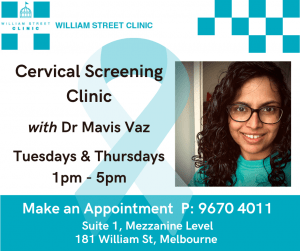Cervical Screening – are you up to date?
By Dr Mavis Vaz – GP, Atticus Health William Street
While we have been locked down for the last several months, I have noticed in my conversations with patients that a lot of them have been putting off blood tests, screening tests etc. in order to avoid leaving their homes. It is so important, that now that the threat of COVID is significantly reduced, that patients come in for these tests as soon as they are able.
As a female GP, I love women’s health! Any questions you might have about your health, please bring them my way. I thought this would be a good opportunity to talk about cervical screening. Most patients are aware that cervical screening has changed in the last few years, but are not entirely sure what exactly these changes are.
The test that used to be called a Pap smear, is now called a cervical screening test. While it is performed the same way that a pap test was, much else has changed. We now start doing cervical screening at the age of 25. However, if you have any abnormal bleeding before the age of 25, please come see us, and we will likely do the test then. These tests are screening tests for cervical cancer. Pap tests allowed us to look at a woman’s cervical cells every 2 years for any cancerous change. Large scale studies over the last few years have led to the recent change, where we now look for humanpapilloma virus (HPV), which is the largest risk factor for cervical cancer. Because we are essentially catching the risk of cancer one step earlier, we can now go 5 years, instead of 2 years between screening tests. Many patients worry about going so long between tests, and it is worth understanding why this change was made, and also knowing that the change was backed by research on thousands and thousands of tests.
We know that it takes 10 years from when you first catch HPV, to develop cervical cancerous change. So when we test your sample, if you don’t have HPV, we don’t need to retest you for 5 years, since we know that the risk of you developing cervical cancer in the next 5 years is very very low if you don’t have HPV today. If you do have HPV, we then look at the cells on the same sample to see if you have any cancerous change (similar to old pap tests). We will then see you much sooner than 5 years, and perhaps refer you to a gynaecologist, depending on your test results.
Feel free to book in with me if you are due for your pap smear, if you are getting your first pap test, or have any other questions or symptoms related to women’s health!

Dr Mavis Vaz will be running a cervical screening clinic at Atticus Health William Street (Melbourne CBD) – every Tuesday and Thursday from 1pm – 5pm. To book into this clinic please click here. Or call 9670 4011 to make an appointment.




